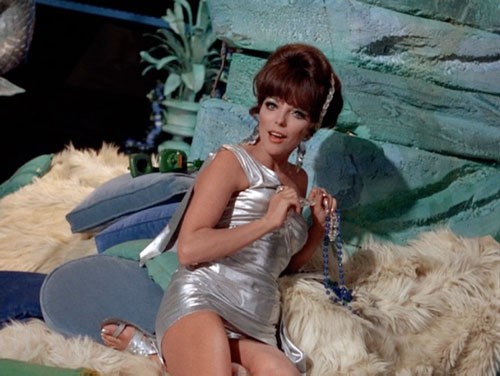[Desmond Doomsday Voice]Great podcast from the...Terrific Trio??[Desmond Doomsday Voice]
A note about Doctor Dolittle: yes, it was a flop, but Fox still had enough confidence in its producer--Arthur P. Jacobs--to allow him to continue developing the adaptation of
Planet of the Apes (he bought the rights to the novel in 1963). So, Jacobs moved from the flop to phenomenon in one year.
Batgirl Theme: So, Willy Mack was Dozier? If so, I wonder why the profit-loving Dozier never tried to release the
Batgirl Theme as a single in advance of the season, or in September of '67? Even if it did not chart, 20th Century Fox Records could have released promotional records to announce her addition to the series.
Robin: I always loved Robin threatening to let Siren fall to her death, as it made Robin not so much of a "golly gee" sidekick, reinforcing Benton Bellgoody's observation (from
"The Cat's Meow") that Robin has
"a little bit of the devil" in him for the threatening tone of Robin's
"...and tell her fast." He was, after all, the half of the duo who was always ready for a fight, or promising to deliver a beating (in so many words) while punching his open palm. That's no Jimmy Olsen from the
Adventures of Superman, or Beaver Cleaver.
Adam on acting: Odd that Adam West thought the rule of thumb was that it took at least two years to become employable & the public to stop identifying the actor as the character they're recognized for playing. A few actors who moved from one famous role into another in one year:
- Efrem Zimbalist, Jr moved from the end of 77 Sunset Strip to The F.B.I..
- Bob Denver's part as Maynard G. Krebs on The Many Loves of Dobie Gillis (which made him famous) ended in '63, but nothing prevented him from becoming Gilligan in '64.
- Raymond Burr finished Perry Mason in 1966--the same year he shot the pilot movie for Ironside, which was released--along with the regular series--in 1967.
- Jack Klugman finished his Odd Couple run in 1975, and started Quincy, M.E. in 1976.
- Michael Landon remained with the long-running Bonanza right up to its 1973 cancellation, and jumped into Little House on the Prairie in 1974.
One could argue Burr, Denver, Landon and Klugman were just as recognized in roles as iconic to TV audiences as Batman, but they effortlessly moved into (what would become) other famous characters in less than the two year rule of thumb West referred to. I think the one and only barrier to West moving on was playing--as he put it--a cartoon character. You could be a sloppy sportswriter on one show and transform into a believable medical examiner overnight because that type of character is simply not disrespected in the way a guy in tights would be. He had to know that, since he had George Reeves as an example of that comic book typecasting problem.
Perhaps he was not being completely honest about what was he thought was around the corner.
Music: I thought May's music (as the duo slide down into the Batcave) was one of the best pieces of his work on the series, as it had a sense of urgency and at least had an identity of its own, instead of trying to mimic Riddle or be generic action cue.



